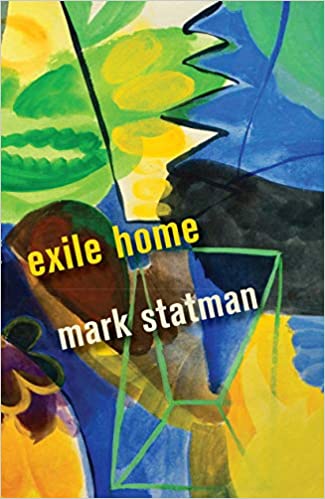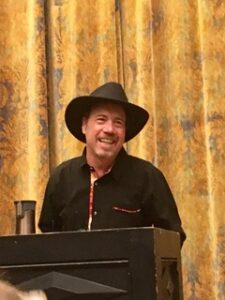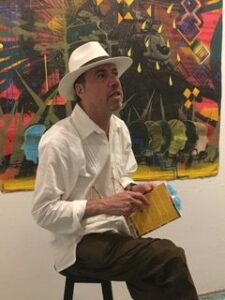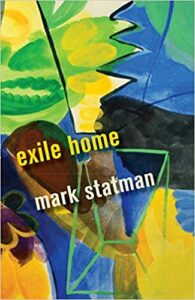
LISA DART – SURVIVAL POETRY AND THE VOICES OF EXPERIENCE
I interviewed Lisa Dart, finalist in the Grolier, Aesthetica and Troubadour Poetry Prizes and author of The Linguistics of Light (poems, Salt, 2008), Fathom (prose


Part one of an in-depth interview with international poet and translator Mark Statman whose recent volume Exile Home is his 10th published collection. Mark, who has won national arts awards, is Emeritus Professor of Literary Studies at Eugene Lang College of Liberal Arts, The New School, NY, and now lives in San Pedro Ixtlahuaca and Oaxaca de Juárez, Mexico.
Leslie: You start your new poetry collection Exile Home with an elegy to your father. Thinking personally, as a writer/teacher, how have you experienced father-son culture, in USA? How is it expressed in the contemporary arts?
Mark: My personal experience with father-son culture is both as a father and a son. As you note, the first poem of Exile Home, “Green Side Up,” is an elegy for my father who died in March 2018. In a certain way, the death of my father revealed to me that while he was a man who appeared to wear his heart on his sleeve, there were certain secrets. I write about it in the poem. He had stage 4 lung cancer, and he knew it, but he told no one, not even my mother, and we only learned shortly before he died. It was this complete screw-up on the part of his doctors. He hadn’t smoked in over forty years so while they would check on his heart, his kidneys, all that, they neglected his lungs. So they found out when it was too late to do anything at all. And he told no one! My parents had been married 65 years and he hid this from his wife. It made me wonder what else he might have been hiding?
We were close but in a kind of casual way. I think the division of labor in my family seems to have been very traditional. My father went to work in the morning and came home late and he ate dinner and watched a little television, maybe a ball game upstairs if there was one to be watched—there weren’t many in the pre-cable days. On the weekends there was work to do around the house. It always seemed like the emotional work of the family was done by my mother.
After my father retired from work—he’d been an executive at The New York Times, we became closer. My parents first moved to Florida and then later to Arizona. In a way the distance helped and so did being retired. He loved to play golf, he loved to relax in the morning over the newspaper with a cup of coffee and not do anything. For a long time in Arizona he was a substitute high school teacher—he claimed it was to pay for his greens fees for golfing, but he kept doing it even after he stopped golfing and I know it was because he really enjoyed hanging out with young people, he liked to talk with them, listen to them, think maybe he had something to say to them. I know he felt like his life was bigger for their presence in his life.
Over time my father and I developed certain rituals. We shared a great love OF sports, baseball and American football, in particular, though we didn’t share favorite teams exactly. He was a big New York Yankees fan and I’m a New York Mets fan. He was a big New York football Giants fan until his move to Arizona when he then became an Arizona Cardinals fan. We would speak on the phone every Sunday during the football season, just before the Sunday games started. Baseball we could talk about more frequently because pre-pandemic the games played out almost every day from April through October and into November. I know in a certain way this doesn’t sound meaningful but sport is an extremely convenient medium for spending time together. You can say a lot of things besides talk about the sport itself—it’s the backdrop for all kinds of other conversations, about work, about family, about politics, life. There’s a terrific essay by Donald Hall, “Fathers Playing Catch With Their Sons,” you can find it in a collection with the same name, in which he captures this dynamic.

As a father, my experience has been a difficult one. I love my son, Jesse Statman. He’s an incredible singer-songwriter-musician who goes by the stage name of Cannonball Statman and has toured all over the world. We have some very good moments and some uneasy ones. Partly that’s because it’s only recently that I’ve really learned how important it is to let him live his life on his terms. It’s something I’ve always known intellectually but on the emotional level, that feeling of Please don’t make that mistake is hard to avoid. I’ve tried and am trying to get better at it. It’s funny because when he was growing up he was a terrific baseball player and we used to play ball together all the time. When we all moved down to Mexico together in 2016, we brought our baseball gloves and we’ve played catch a few times. There really is something in the rhythm, the back and forth of the ball that moves one outside of time. It’s almost as though the physical space has changed and one is able to think and talk in ways that are different from sitting in a living room or at a dining room table.
I’m not sure I can say how much it’s captured in the contemporary arts. I know that Ed Hirsch’s book Gabriel is extraordinarily moving. I love the moment in the movie Field of Dreams with Kevin Costner when, at the end of the picture, Ray (the part played by Costner) calls out to the character who plays the part of his father as a young man and asks him if he’d like to play catch (baseball again! is there a pattern here?). Gary Snyder has a poem in Turtle Island, which won the Pulitzer Prize for Poetry in 1975, “The Bath” in which he talks about bathing his young son, Kai, and there are the lines:
And wash-tickling out the scrotum, little anus,
his penis curving up and getting hard
as I pull back skin and try to wash it
Laughing and jumping, flinging arms around,
I squat all naked too,
is this our body?
And I think to myself, could Snyder even publish these lines today? Would he be accused of being some kind of abuser of children?
I think in the USA there isn’t a single experience, but because it’s such a huge country, with multiple cultures, regional, economic, there really is no single way to say what it is. When my son Jesse was growing up, and he was this highly touted baseball player, a standout hitter and pitcher, we discovered a culture that valued a kind of success that had nothing to do with music or painting or poetry. He also got very interested for a while in bowling; again he was very good at it, and the bowling alleys of Brooklyn have their own peculiar culture. Jesse stopped playing both sports when he decided to commit to his work as a musician. Being an artist brings him to a whole different culture, another set of values than those of baseball or bowling. Closer to the ones of his life at home, I think.
Leslie: In the USA, how is the suppression of the female transmitted in male culture and what is the way forward for men?
Mark: I’ve been thinking about this question. In an interview you and I did a while ago we talked about the relationship of my work to my studies in religion. I just finished reading Elaine Pagels, Why Religion? which came out in 2018. It’s a memoir of a sort, and in it she reminded me of the wonderful and strange times those of us who were involved in the study of religion experienced in the 1970’s. I studied briefly with her at Columbia but her work has remained very important to me to this day. She writes in this book about the importance of recasting the role women played in the development of religions and the ways in which they have been historically (and repeatedly) erased in the Judeo-Christian tradition. The why of this erasure is a huge topic. But I think it’s one of the great, unfortunate sources of the suppression of women in the western culture. You can see it in the USA. One can go over the whole history of the country and it’s such a mess. Part of Pagels’ work, and you can see this in her writings on the Nag Hammadi Library, her book The Gnostic Gospels, and so on, is to re-establish how central and essential women were in the formation of Christianity and the cultural sabotage that went in to making sure that the centrality and essence were eliminated.
But to talk about the transmission, look no further than Donald Trump. Of course he’s pretty awful to most people he thinks are against him, but his treatment of women goes beyond that. If they are not in a role in which they play some kind of subservient enabler of his desires (physical, intellectual, emotional) then he reacts with a hostility that seems to come completely out of fear or ignorance of situation. One need only see this in how he talked about Hillary Clinton during the last electoral campaign, the dozens of lawsuits filed against him for sexual assault, the way he refers to female opponents, his positions on women’s health issues. Of course, he’s just as bad when it comes to people of color, to people with disabilities, to poor people, to basically anyone he considers, as he referred to members of the armed forces, losers. But competent women seem to really disturb him most.
And the kind of support he receives shows this. Recent polls suggest that many women have never supported him and the ones who had have abandoned him in droves as they’ve learned more and more about him. His recent performance in debates has shown how little commitment he has to any ideals the United States claims to stand for, from democracy and justice to fairness and liberty. He is quite the abomination.
But Trump has given others who hold similar misogynistic and racist views permission to speak the way he does. The rise of a fascistic right in the United States is frightening. It’s frightening that this demented id is the current President of the United States. Of course we’re doing this interview before the election. I can only hope passionately that things will change with the November elections.
Leslie: Besides the death of your father, tell us what else inspired Exile Home. What are your working methods? Beginning from the very earliest intuitions, how did you work on the poems in the volume?
Mark: I don’t think I’d say that the death of my father inspired Exile Home exactly. The book was more or less written before the death of my father in March 2018. In a certain way, “Green Side Up” stands outside the main text of the book, and it changes certain ways in which one reads the whole of it. My father’s death was such a surprise, I wrote the poem and realized I had to include it. In Exile Home overall, I’m taking the time to reflect on some immediate life changes, starting from the point of deciding to leave the United States, to leave my teaching job of 31 years, for my wife, my son, and I to leave our Brooklyn home of 25, and to move permanently to Mexico. For the book to capture the essence of the move and my changed life, I had to include the death of my father, with all its sadness and, in remembering him, some of the joy.
And there has been so much joy in the move, in being in a new and marvelous place, with which Katherine and I were already familiar, but really as visitors. To live here in centro Oaxaca, which is a small and exciting city, as well as in our little country place in San Pedro Ixtlahuaca, has been, and still is, really inspiring. And it has been that way even with Covid. People are very good here about wearing masks (cubrebocas) and practicing social distancing, we call it sana distancia, about hand washing and having one’s temperature taken entering and leaving markets, restaurants, banks, and so on, that we’ve been doing fairly well, despite some of the things I’ve read in the US papers. These days markets are open, restaurants, bars. The streets are full of life, music. It’s all clothed differently, but Oaxaca seems very much itself.
 So the move inspired Exile Home, the changes in life, in place, in how I live. The book works through and describes the changes, describes the new life. Whether it’s the life on the street or life in the country, there’s so much that is exciting and different. I wanted to record all that. I’ve been coming to Oaxaca since 1986 and while the city itself has changed somewhat, it’s bigger, more sophisticated, has wonderful cafes and restaurant that it didn’t thirty years ago, the essence of the place, a certain quiet, a certain soulfulness, is still there.
So the move inspired Exile Home, the changes in life, in place, in how I live. The book works through and describes the changes, describes the new life. Whether it’s the life on the street or life in the country, there’s so much that is exciting and different. I wanted to record all that. I’ve been coming to Oaxaca since 1986 and while the city itself has changed somewhat, it’s bigger, more sophisticated, has wonderful cafes and restaurant that it didn’t thirty years ago, the essence of the place, a certain quiet, a certain soulfulness, is still there.
I’ll have another book of poems come out next year, which seems a kind of companion to Exile Home. It reflects as well on life here. The difference though is that the poet and critic Eileen Murphy in a recent review noted, that Exile Home is about me having found my happy place. But Hechizo, the word translates as a kind of spell and it can be a good one or a dark one, and is the tentative title of the new book, goes more toward the darkness. It’s a darkness that to a certain extent has been catalyzed, I think, a little by the virus and my concerns about some of the political, environmental, and cultural awful things becoming ever more obvious in the world. But it also reflects on the fact that as wonderful as life had been here even before Covid and Trump, no place on earth is really paradise. At least for me. I am happier here, yes, I think, than any place I’ve ever lived, but even here one can’t help but be wounded
My writing practice has changed a little since moving here. I have always written in notebooks and, in the past, I usually waited until a notebook was full before beginning to type the poems. I’ve liked to let the poems sit for a while to see if they’re worth working on. Usually about half seem to be. Once typed and printed, my process had been to revise and revise, most poems go through ten, twelve, twenty revisions. I love revision. I love sitting with just two or three lines and waiting with them, trying out different possibilities for words, for arrangement. I spend a lot of time listening for the music each poem offers. If I’m doing my work well, it should take a while for this to happen, because it’s something worth working on, usually it’s something I haven’t done before and I have a lot of learning to do.
This all used to take about three or four years for a poem to really get to the point I thought it finished, or at least close, or to realize it really wasn’t going to go anywhere at all. So what’s changed really is not the method, I still work that way, but the time frame. After I moved to Oaxaca, I was getting ready to prepare for the book of poems scheduled for Spring 2019 publication. But I realized that the poems I’d been working on since the publication of my previous book of poetry That Train Again in 2015, and which the most recent published in there I probably had started in 2012 or 2103 and finished in 2014 or 15, didn’t seem to have much resonance for me. I liked the poems just fine but I didn’t feel as connected as I thought I needed to be in order to really revise them. I wasn’t in Brooklyn anymore, I wasn’t teaching poetry, I wasn’t suffering winters or New York City August heat. I made the decision to try and take the poems I’d been writing just prior to moving to Mexico and since the move and see if I could compress the normal time period of revision. Instead of taking three or four years, I wanted to see if I could do it in two or even one. And I think I found I could. Since my time is much more my own now, the obligations I have are somewhat of my own choosing, I was able to work longer and even more deeply on the poems in a shorter amount of time. One thing I like about that is that the poems still feel rather immediate and new to me, they lack a certain familiarity. A downside is that I think in the immediacy, I still like some poems because they feel new and I’m not quite sure how good I think they are. I’m very fortunate in that I have some very good readers of my work who look through the manuscript well before I turn it in for publishing. Katherine, of course, and poets Pablo Medina, Joseph Lease, John Yamrus, and Marshall Malin. They do a very good job of pointing out things that aren’t working, that need more work, that don’t belong. I usually find ways to agree with them. Although there are some poems I’m not sure I should have included, and some, looking at the ones I rejected that I think maybe I should have out in, on the whole I’m pretty sure Exile Home has some of my better and best work.
Next week, in Part 2, Mark Statman talks about his creative processes and cultural difference between Mexico and New York.
ABOUT LESLIE TATE’S BOOKS:

I interviewed Lisa Dart, finalist in the Grolier, Aesthetica and Troubadour Poetry Prizes and author of The Linguistics of Light (poems, Salt, 2008), Fathom (prose

I interviewed writer Julia Lee Barclay-Morton about her experience of autism. Julia began as an experimental dramatist in New York, moving to the UK to

I interviewed Gillean McDougall from Glasgow, who edited the collaborative projects Honest Error (on Charles Rennie Mackintosh and his wife Margaret Macdonald) and Writing the

I interviewed French writer Delphine de Vigan, whose book, No et moi, won the prestigious Prix des libraires. Other books of hers have won a clutch

I interviewed Joanne Limburg whose poetry collection Feminismo was shortlisted for the Forward Prize for Best First Collection; another collection, Paraphernalia, was a Poetry Book Society Recommendation. Joanne
| Cookie | Duration | Description |
|---|---|---|
| cookielawinfo-checkbox-analytics | 11 months | This cookie is set by GDPR Cookie Consent plugin. The cookie is used to store the user consent for the cookies in the category "Analytics". |
| cookielawinfo-checkbox-functional | 11 months | The cookie is set by GDPR cookie consent to record the user consent for the cookies in the category "Functional". |
| cookielawinfo-checkbox-necessary | 11 months | This cookie is set by GDPR Cookie Consent plugin. The cookies is used to store the user consent for the cookies in the category "Necessary". |
| cookielawinfo-checkbox-others | 11 months | This cookie is set by GDPR Cookie Consent plugin. The cookie is used to store the user consent for the cookies in the category "Other. |
| cookielawinfo-checkbox-performance | 11 months | This cookie is set by GDPR Cookie Consent plugin. The cookie is used to store the user consent for the cookies in the category "Performance". |
| viewed_cookie_policy | 11 months | The cookie is set by the GDPR Cookie Consent plugin and is used to store whether or not user has consented to the use of cookies. It does not store any personal data. |